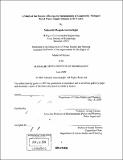A study of the factors affecting the sustainability of community managed rural water supply schemes in Sri Lanka
Author(s)
Amerasinghe, Nishanthi Manjula
DownloadFull printable version (5.678Mb)
Other Contributors
Massachusetts Institute of Technology. Dept. of Urban Studies and Planning.
Advisor
JoAnn Carmin.
Terms of use
Metadata
Show full item recordAbstract
Disparities in water supply coverage in urban and rural areas are high in developing countries, with rural coverage being much lower. The inability of governments to provide the service because of resource constraints, and the paradigm shift in development that called for a bottom up approach to development, led to the widespread adoption of community managed rural water supply schemes since the 1980's. Over 3000 community managed rural water supply schemes, primarily funded by bi-lateral and multi-lateral donors, have been implemented in Sri Lanka, since the 1980's. How viable are these schemes once the initial support and organization run their course? This thesis assesses the factors affecting the long-term viability of the demand-driven, community-managed rural water supply schemes in Sri Lanka, through the review of four community managed rural pipe water supply schemes. These schemes have been operational for three to six years. The findings indicate that community participation is high during planning and construction and led to an increased sense of ownership. However, the community enthusiasm has waned after commissioning and viability was dependent on several factors. These include, community leadership and the organizational capabilities of the CBO, ability to raise and manage the necessary finances, choice of technology ensuring ability to maintain and meet water quality needs over the design life, economies of scale, need to move away from voluntary to paid labor, need for on-going training, and the need for routine monitoring by external agencies. (cont.) Governmental agencies should not abdicate their long-term responsibilities entirely to the communities to which they offer project funding in the short-term. The government needs to provide some long term support, probably through on-going training and monitoring of activities of the CBO to enhance long-term viability.
Description
Thesis (S.M.)--Massachusetts Institute of Technology, Dept. of Urban Studies and Planning, 2009. Includes bibliographical references (p. 110-114).
Date issued
2009Department
Massachusetts Institute of Technology. Department of Urban Studies and PlanningPublisher
Massachusetts Institute of Technology
Keywords
Urban Studies and Planning.